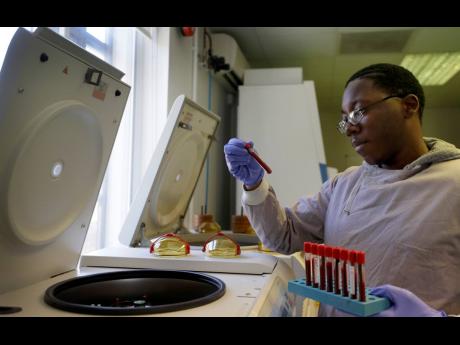UK to infect healthy volunteers in vaccine research trial
Danica Marcos is willing to be infected with COVID-19.
While other people are wearing masks and staying home to avoid the disease, the 22-year-old Londoner has volunteered to contract the new coronavirus as part of a controversial study that hopes to speed up development of a vaccine.
Marcos and other young volunteers say they want to take part to help bring an end to the pandemic after seeing the havoc it has wreaked. The grandparents of Marcos’ best friend died early in the crisis, and as a volunteer for a homeless charity she has seen the struggles of those who have lost their jobs.
“So many people [are] struggling right now, and I want this pandemic to be over,” Marcos told The Associated Press. “Every day that goes on, more cases are going on, more people are dying. And if this vaccine trial could mean that this period of trauma for the whole world will be over sooner, I want to help. I want to be a part of that.”
Imperial College London and a group of researchers said on Tuesday that they are preparing to infect 90 healthy young volunteers with the virus, becoming the first to announce plans to use the technique to study COVID-19 and potentially speed up development of a vaccine that could help end the pandemic.
This type of research, known as a human challenge study, is used infrequently because some question the ethics of infecting otherwise healthy individuals. But the British researchers say that risk is warranted because such studies have the potential to quickly identify the most effective vaccines and help control a disease that has killed more than 1.1 million people worldwide.
“Deliberately infecting volunteers with a known human pathogen is never undertaken lightly,” said Professor Peter Openshaw, co-investigator on the study. “However, such studies are enormously informative about a disease, even one so well studied as COVID-19.”
Human challenge studies have been used to develop vaccines for diseases including typhoid, cholera and malaria.
Imperial College said the study, involving volunteers aged 18 to 30, would be conducted in partnership with the government’s Department for Business, Energy and Industrial Strategy, the Royal Free London NHS Foundation Trust and hVIVO, a company that has experience conducting challenge studies. The government plans to invest €33.6 million (US$43.4 million) in the research.
ETHICS COMMITTEES
Governments around the world are funding efforts to develop a vaccine in hopes of ending the pandemic that has pummelled the global economy, putting millions of people out of work. Forty-six potential vaccines are already in human testing, with 11 of them in late-stage trials – several are expected to report results later this year or in early 2021.
The Imperial College partnership plans to begin work in January, with results expected by May. Before any research begins, the study must be approved by ethics committees and regulators.
While one or more vaccines are likely to be approved before then, the study is needed because the world may need multiple vaccines to protect different groups within the population, as well as treatments for those who continue to get sick, said Dr Michael Jacobs, a consultant in infectious diseases at the Royal Free London NHS Foundation Trust who will take part in the research.
“I don’t think many people think that what we’re doing as scientists is searching for a silver bullet,” Jacobs said. “We’re going to need a whole raft of interventions in order to control this pandemic.”
Critics of challenge studies question the need to expose healthy people to the virus when the disease remains widespread and vaccine development is moving quickly. Tens of thousands of volunteers around the world have already signed up to participate in more traditional vaccine trials.
In the first phase of the study, researchers will expose paid volunteers to the virus using nasal drops in an effort to determine the smallest level of exposure needed to cause COVID-19. Ultimately, the same model will be used to test the effectiveness of potential vaccines by exposing volunteers to the virus after they’ve received one of the candidate vaccines.
The research will be conducted at the Royal Free Hospital in London, which has a specially designed area to contain the disease. Volunteers will be monitored for at least a year to ensure they don’t suffer any long-term effects.
Challenge studies are typically used to test vaccines against mild infections to avoid exposing volunteers to a serious illness if the vaccine doesn’t work. While the coronavirus causes only mild or moderate symptoms in most people and seems to be especially mild in young, healthy individuals, the long-term effects of the disease aren’t well understood, and there have been reports of lingering problems in the heart and other organs, even in those who don’t ever feel sick.
In the United States, the National Institutes of Health has downplayed the need for challenge studies given the speed with which vaccines are being developed, but it has taken preliminary steps to prepare for such research in case the approach eventually is required. Those steps include examining the ethics of a challenge study, and funding research to create lab-grown virus strains that potentially could be used.
AP

